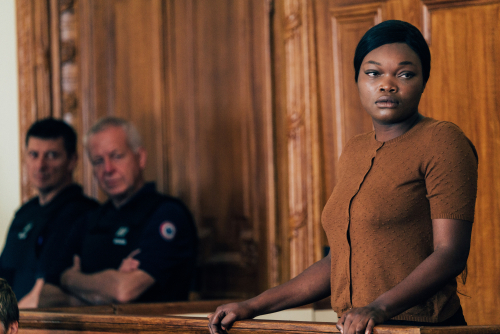
Super Ltd.
MOVIE REVIEW
Saint Omer (2023)
As fairytales are to children, courtroom cases are to adults. A terrible thing has happened; and society comes together in a highly structured and regulated format to decide how to handle it. Instead of the terrible thing, the focus becomes the process of how society deals with it. A courtroom is a mirror of society, but structural issues such as racism or sexism are not under its purview; only individual actions are up for discussion. And once the decision of the court is made, the terrible thing can be wrapped up with a tidy little bow. Whether or not justice was done is not quite the point.
In a French coastal town called Saint Omer, there is a courtroom, where a trial has been called to try to handle a very terrible thing. Laurence (Guslagie Malanda) is in her mid-30s, a philosophy student from Senegal, estranged from her family and in a miserable long-term relationship with a much older man named Luc (Xavier Maly). Luc has a wife and adult children who knew nothing of Laurence, who eventually barely left the studio apartment Luc rented for her in Paris. When Laurence became pregnant, they did nothing. The pregnancy continued, Laurence gave birth alone; and it’s not that the baby was a secret, only that Laurence was so isolated and alone nobody noticed Elise. That is, until the day Elise’s body was discovered on a Normandy beach, where Laurence had left her to drown. She was 15 months old.
How could this have happened? Laurence herself doesn’t know; right at the start she says she hopes the trial will be able to tell her. The court is not unsympathetic; the judge (Valérie Dréville) occasionally has tears in her eyes. Under French law it’s the judge who leads the questioning; and sometimes the prosecuting lawyer (Robert Canterella) and the defense lawyer (Aurélia Petit, who does a wonderful job with the closing monologue) question the witnesses as well. Laurence is a calm and educated woman who matches no stereotype of women who kill their children. And yet.
One way to handle a terrible thing is to make art about it. Everyone in the courtroom around Laurence is white, with two exceptions: her mother Odile (Salimata Kamate) and a writer/professor named Rama (Kayije Kagame). It’s obvious Rama is a stand-in for director Alice Diop even before she takes a call from her publisher about a proposed project on the trial, tentatively titled “Medea Castaway.” Medea, of course, was the goddess in Greek mythology who killed her children after their father, Jason, abandoned her for another woman (who Medea also killed). Before leaving for the trial, Rama shows her university students footage of France’s liberation, specifically of women who collaborated with the Nazis, who had their heads shaved and were paraded through their towns as punishment. She discusses this in reference to Marguerite Duras’s film “Hiroshima, Mon Amour,” which is about whether people can move past trauma and come to terms with the people who did them harm. The metaphors of Medea and the Nazi collaborators remind us our societies have long experience in sanitizing horror, but since they are meant as parallels to Laurence’s sad life, they are deeply offensive. Rama’s difficult relationship with her own mother seems to be why she is compelled to attend the trial, but this is never directly addressed. Apparently Ms. Diop figured whatever baggage the audience has with their own mothers would do that work for her.
In that context, the choices of “Saint Omer” makes perfect sense, especially if you know it adheres very closely to a real-life murder that happened near Saint Omer a decade ago. How closely? Ms. Diop, who attended the real trial, built the script (which she cowrote with Amrita David and Marie N'Diaye) around the genuine trial transcripts. All the names have been changed, but that hardly matters. Ms. Diop chose to make “Saint Omer” a courtroom drama so the nightmare of Laurence’s life, and the unguessable truth of Elise’s, can be minimized in order to praise how France, as a society, deals with its nightmares.
On that level, “Saint Omer” is a triumph. France submitted “Saint Omer” for Oscar consideration this year; there is no stronger official endorsement for how a film speaks for a nation. If Ms. Diop had told the story of the crime itself, of the step-by-step process through which Elise was taken to that beach, this would not be the case. That would have been an indictment of French society by a black filmmaker, something the nation might be less happy to endorse. Instead, in service to her career, and in the name of art, Ms. Diop has done a terrible, terrible thing. It’s difficult to accept she made an excellent movie about the death of a real child wherein she twisted the narrative to make it all about herself. And it’s tougher still to observe how delighted the nation of France is with this tidy little package. When Lupita Nyong’o won her Oscar for “12 Years a Slave,” she gave an acceptance speech which reminded the world the pain she depicted belonged to a real person. If “Saint Omer” wins, will anybody do the same for Adelaide Kabou?
Comments